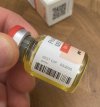How do these compounds like eq and primo effect e2 that’s raised due to hcg? I take my test/hcg/adex eod due to lowish (20-22 range) shbg. Test itself barely effects my e2. Before I added hcg, I only needed about .10 mg of adex eod on 250 mg of test a week. Hcg sky rocketed my e2, through trial and error I settled on a dose of 100 iu eod which gives the right balance of the cosmetic effect and also seems to be the dose where I can manage my e2 the best. I need about .50-75mg of adex eod to keep my e2 in range.
Primo does not have any effect upon E2 of which I am aware.
By this I mean, from what I know (and we all continue to learn new things but at this time) primo is simply not participating in the conversion to E2, stimulating E2, inhibiting E2, increasing or decreasing E2.
Boldenone can be a substrate for aromatization and converts to E2 at about half the rate compared to that of testosterone. This means, the boldenone as a substrate for conversion, will contribute to an increase in E2 (unless the aromatization process has already been saturated and reached its rate limit by another factor regardless of additional substrate).
However, downstream metabolites resulting from the break-down of the boldenone will decrease E2 conversion. Also, the 5-alpha-reductase downstream product is the reduced form of Bold known and DHB which (like other DHT derivatives) can not covert to E2. This DHB is a powerful steroid.
Some of the other boldenone metabolites will act as power AI.
At first you have mostly Boldenone in your system and it will be a substrate for E2 production as mentioned, which should increase the E2 level. Then, over time as metabolites build up in the system, the metabolites with AI properties will reach a level where their inhibition of E2 production overtakes the boldenones contribution to increased E2; at some point the net result of the increased E2 from boldenone amortizing paired with the decrease in E2 production as a result of the metabolites with AI-like properties will result in an overall lower level of E2.
It is not the boldenone itself that lowers E2; over time the breakdown products from boldenone will lower E2.
HCG raises E2 primarily by raising testosterone levels (again, from my understanding, but I am sure there may be more details). HCG stimulates the products of more testosterone, then this additional testosterone is a substrate for aromatization. If this was the end of the story, the answer would be simple (that primo does nothing to help with HCG’s effect on E2 and bold would eventually lower HCG’s effect by the boldenone metabolites inhibiting substrate aromatization conversion to E2).
The problem with HCG is that it may be more complicated than simply stimulating more E2 substrate (testosterone). I have read that AI’s do not have the same level of benefit in regards to HCG users and E2 issues. Some claim the testosterone produced by the Leydig cells is immediately converted to E2 locally in the testis and not dependent on traveling to the liver and other tissues where it may encounter aromatase. There may even be some direct estrogen production (but I am ignorant regarding these details).
Some of these research papers suggest to me that it may be possible there are additional and more immediate reasons HCG increases estrogen:
•
Serum estradiol after single dose hCG administration correlates with Leydig cell reserve in hypogonadal men: reassessment of the hCG stimulation test - PubMed
•
Plasma estradiol concentrations and effect of HCG on plasma estradiol and testosterone in normal subjects and patients with endocrine disorders - PubMed
If this is the case, and HCG has a more direct path to increase estrogen, Boldenone (and most likely many other compounds including dedicated AIs) may not on this estrogen.
Nonetheless, one may still lower other sources of estrogen by traditional means (or even novel tactics such as the boldenone metabolites; or a sum of multiple approaches) and may see a net reduction in total estrogen although the HCG has increased a specific source of estrogen.






